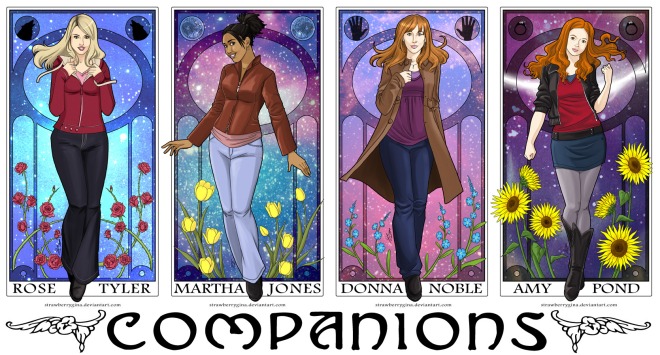
[I don’t watch Dr. Who and have no idea if this makes sense] [Source]
I believe that in 2016 we are moving into a different age: The Age of the Companion.
A companion isn’t a piece of software that you open to get something done. Rather, it proactively works with you to get things done, works autonomously when you’re not around, and may integrate multiple apps and hardware to work.
That’s still a vague definition, but it ties together a trend I’m seeing that hasn’t yet had a good name put to it.
The simplest examples are companions that work directly alongside or inside good old apps (remember apps? From the previous age? Those were the days). Facebook’s M is a companion that lives inside of Facebook Messenger–which is itself a sort of companion to Facebook. M’s artificial intelligence is able to chat with a person, offering assistance with almost anything; a good example is getting it to cancel your cable subscription for you. A companion that helps you avoid the pure evil of Rogers or Comcast is sure to become your best friend pretty quick. Right now, a human on the other end takes over when the AI can’t, but that will become less common as AI improves.
Similarly, I’ve been using an app called Lark that could be considered a companion. It gathers information from HealthKit (e.g. steps taken, weight, sleep) and sends proactive notifications to motivate you to be healthier. When you open the app, it chats with you, Messenger-style, to gather more information and offer advice.
These examples are software, but companions can be hardware too. The Apple Watch is a bit muddled in its purpose, but I think it works best as a companion to both you and your iPhone. It sends notifications, sure, but even when you’re not paying attention to it, it’s gathering data about you, occasionally offering up advice based on that data (“you’ve almost reached your goal” is a good example; “stand up” every hour is … less good). It can pass information on to other companions (like Lark), essentially forming an AI committee that collaborates to better your life.
Amazon is a surprising early leader in the Age of the Companion. The Echo is a semi-creepy always-listening rod that sits in your house and collaborates with various apps to help you, interacting using mics and speakers alone, as if it thinks it’s people. Their Dash technology detects when physical goods (detergent, printer ink, medical supplies) are running low and automatically orders more. Soon, Prime Air delivery drones will take over from there, flying packages to your home in 30 minutes. Right now I wouldn’t consider those single-purpose drones companions, but what if they ask “can I grab anything else on the way?” before coming? What if they ask “can I help mow your lawn while I’m here?” when they arrive? Maybe putting blades on our AI isn’t advisable (especially after they talk to evil cable companies; it might give them ideas), but, you get the gist.
See the pattern? This isn’t just software. It’s not just the Internet of Things. It’s not just artificial intelligence. It’s all these advancements working together to automatically, proactively make a specific person’s life better.
In the Age of Companions, “there’s an app for that” is replaced by “can we help with that?”
It’ll get disturbing before it gets mundane. “Hey uhhh, your watch detected a drop in serotonin, and your calendar said you’re free for a few hours, so I invited all your nearby friends over to cheer you up. Also, watch out, your new puppy is about to air-drop.” But when companions mature, the world will be much different, and hopefully better. The nice thing is that the Age of Companions is already underway, so even if Lark doesn’t prolong our lives indefinitely, we’ll get to experience a different world if we’re around for a few more years.
The future is becoming a complicated place to live in, but at least we won’t have to do it alone.
* It’s easy to forget that it wasn’t always this way. Most machines served a single function; a phone was a phone (like, a thing you talked into), a screen was a screen, a camera was a camera, etc. Computers have always had applications, of course, but they were expensive toolsets, different than what we generally consider “apps” today.
P.S. Andy Berdan pointed me to another perfect example called x.ai. It automatically works to schedule meetings with a group of people, just by including its address in a regular email. It highlights that, like the other examples above, these companions aren’t apps, and they can run on many platforms.
Our established technology—hardware, sensors, apps, messaging, even email—is becoming a platform for companions. Just like clocks are now only tiny pieces of smartphones, all our whiz-bang gadgets and applications are becoming nothing more than infrastructure upon which companions are built.
